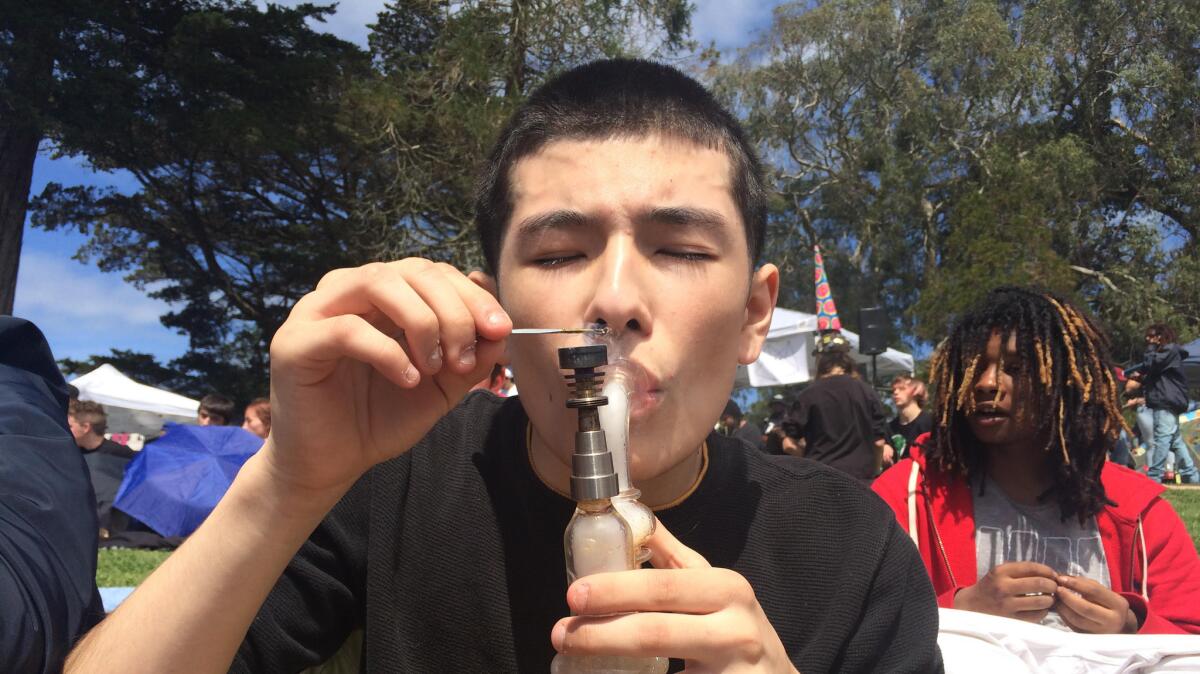Lawmakers offer tax amnesty to pot shops but also threaten to withhold their licenses to operate

- Share via
Reporting from Sacramento — Estimating that two-thirds of the medical marijuana stores in California have failed to pay sales taxes, state officials on Tuesday took a carrot-and-stick approach to persuade pot shops to pay the $106 million owed.
With the state preparing to license medical marijuana shops in 2018, the Assembly sent Gov. Jerry Brown a bill Tuesday that would establish a tax amnesty program to help bring scofflaws into compliance with the law.
The measure would allow medical cannabis sellers to temporarily avoid a penalty of 25% to 50% on late taxes but would block the issuance of new state licenses to any continuing violators.
Assemblyman Mike Gipson (D-Carson), who introduced the bill, said many medical cannabis shops have not registered with the state and paid taxes for fear of criminal prosecution because marijuana remains an illegal substance under federal law.
“You have a lot of businesses that would like to come out of the shadows and do the right thing,” Gipson said.
Voters legalized the medical use of marijuana in California two decades ago; the state has some 2,500 dispensaries.
A recent court decision said federal officials could not spend money to prosecute people who comply with state medical pot laws.
Getting businesses to comply with tax laws is also important because a measure on the November ballot in California would legalize the recreational use of marijuana, potentially resulting in many more businesses opening to sell cannabis.
But the main development that led to the amnesty proposal is a new regulatory scheme approved last year for the state to issue licenses to medical cannabis dispensaries starting in 2018.
“Now that California has officially taken steps to establish a regulatory framework for cannabis, we have an opportunity to engage these businesses to ensure they pay their dues,” Gipson told his colleagues, who approved the amnesty program on a 46-to-13 vote.
The state Board of Equalization, which collects taxes, estimated the 66% rate of non-payment of taxes based on the experience of other states, including Colorado, officials said.
The six-month amnesty period would run from July 1, 2017, through Dec. 31, 2017, and apply to tax liabilities due before Jan. 1, 2015.
Last year’s approval of a state regulatory system requiring pot shops to get state licenses may be enough to persuade businesses “that previously operated underground” to “comply with state tax and regulatory laws,” David J. Gau, the executive director of the board, wrote to lawmakers.
Industry officials, including Nate Bradley, executive director of the California Cannabis Industry Assn., welcomed the amnesty offer.
“Due to the lack of a legal framework and access to basic banking, paying taxes has been extremely challenging for our medical cannabis industry,” Bradley said. “The tax amnesty program proposed in Assembly Member Gipson’s bill will help existing medical cannabis operators more easily transition from operating in an unregulated, gray market to a regulated one.”
Brown was also sent a bill that allows state licenses to be issued to 135 pot dispensaries authorized in Los Angeles when voters approved Measure D in 2013.
State law requires those applying for state licenses to have a license from the city, but the L.A. ballot measure did not provide a city license so special eligibility was needed through legislation, according to Assemblyman Reggie Jones Sawyer (D-Los Angeles).
Follow @mcgreevy99 on Twitter
ALSO
Shut out of banks, California pot shops may soon be able to pay their taxes in cash
Court decision limits prosecution of pot shops
Proposed initiative would allow recreational use of marijuana
More to Read
Get the L.A. Times Politics newsletter
Deeply reported insights into legislation, politics and policy from Sacramento, Washington and beyond. In your inbox three times per week.
You may occasionally receive promotional content from the Los Angeles Times.











